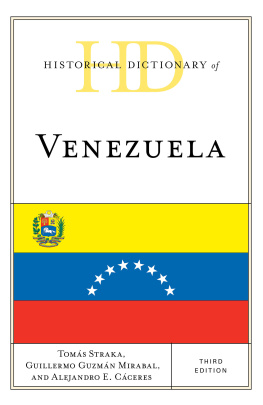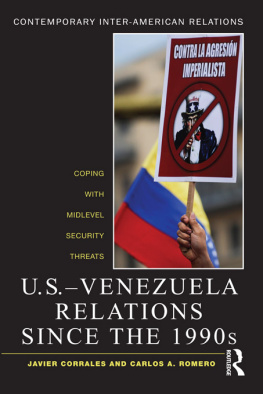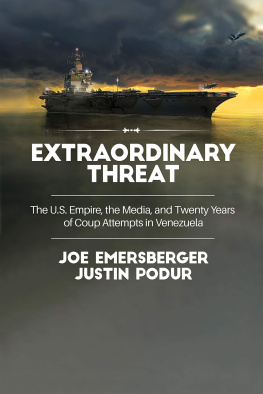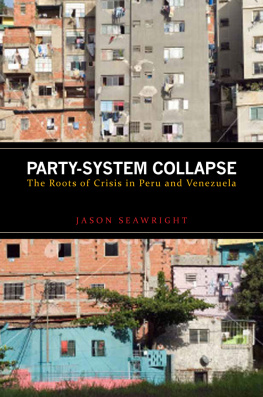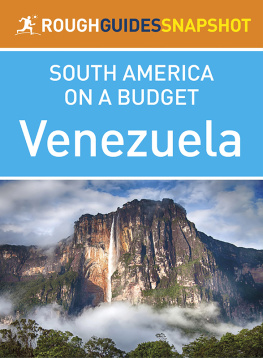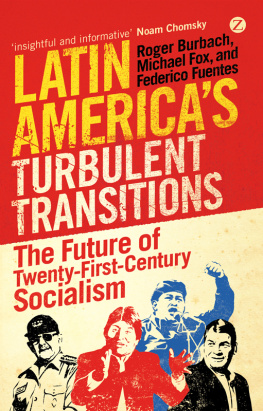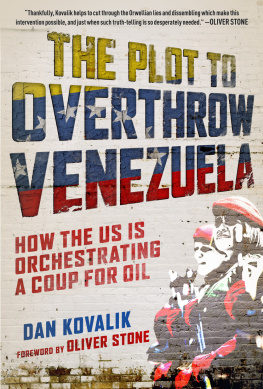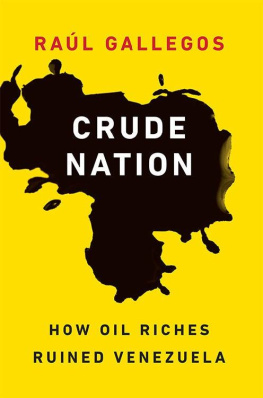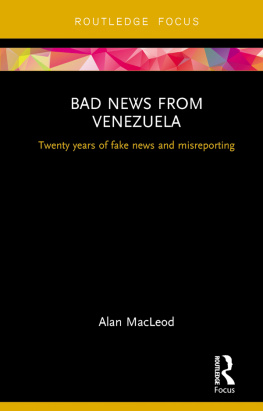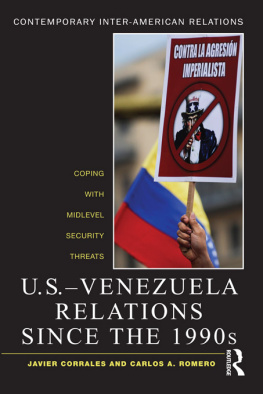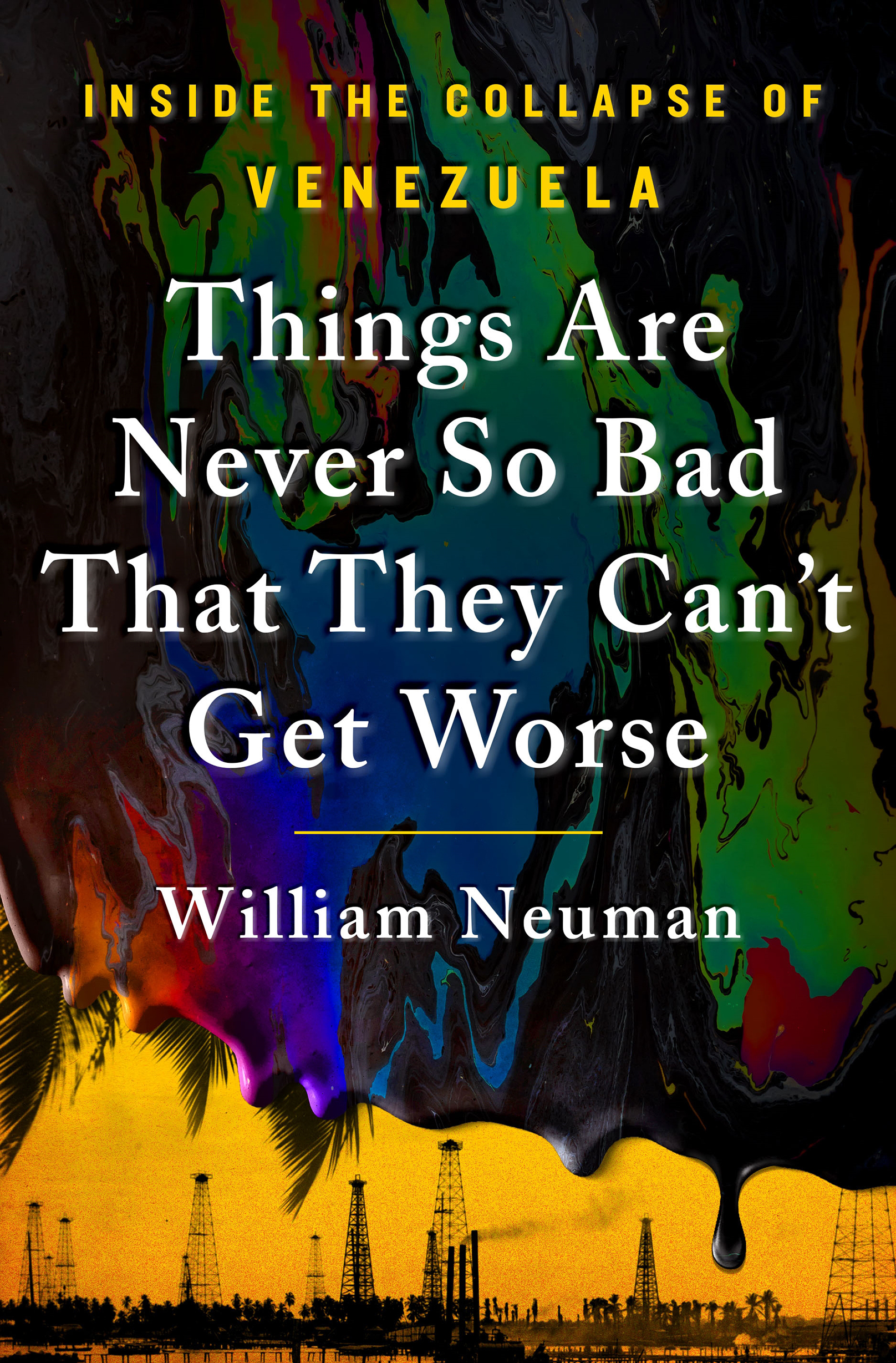Contents
Guide
Pagebreaks of the print version

The author and publisher have provided this e-book to you for your personal use only. You may not make this e-book publicly available in any way. Copyright infringement is against the law. If you believe the copy of this e-book you are reading infringes on the authors copyright, please notify the publisher at: us.macmillanusa.com/piracy.
For Max, Emma, and Romy
For Werner and Judy
with love
As es la humanidad, compadre, que cuando uno quiere hac una gracia le sale una morisqueta. Pero yo lo que digo es que si las cosas estn malas, toava se pueden pon ms piores.
Thats humanity for you, compadre, you try to do something nice for folks and you end up falling on your face. What I always say is, things might be bad now, but they can sure get a whole lot worse.
General Parmenin Cunaguaro in La Primera Versin de El forastero, novela indita, by Rmulo Gallegos, written in approximately 1922 and published after the authors death
Todo se puede poner peor.
Things can always get worse.
Elas Jaua, former vice president to Hugo Chvez, speaking at a conference in Caracas in 2019
Venezuelas first oil well sits on top of a low hill in a town called Mene Grande, near Lake Maracaibo, in the far western state of Zulia. The well was drilled in 1914. It was still pumping oil when I was there in 2014, a few weeks after the government held a celebration marking a hundred years of Venezuela as an oil-producing nation. The well had been spiffed up for the ceremony. There was a small pumpjack, painted in the national colors, yellow, blue, and red, with eight white stars. It nodded up and down, patiently measuring out the national diastole and systole. A pipe that carried away the oil was painted a shiny silver. The well is called Zumaque 1. A century ago there were sumac trees herezumaquesbut I didnt see any on my visit. The pumpjack stood behind a metal railing in the center of a newly paved parking lot. Shadeless under a punishing sun, the black asphalt absorbed and radiated the intense heat.
The history of Venezuela and oil flows through Mene Grande like the crude oil through the silver pipe. The first oil workers strike occurred here (and was put down here) in 1925. In 1976, during the countrys first petro-delirium, when oil prices quadrupled, President Carlos Andrs Prez came to Mene Grande to declare the nationalization of the oil industry. Three decades later, in the midst of an even bigger boom, President Hugo Chvez came here to announce a second nationalization, changing the terms by which foreign oil companies operated in Venezuela and giving the government a controlling stake in everything that happened in the oil fields. There were information boards at the edge of the parking lot commemorating the dual nationalizations; in their telling, Chvez got all the glory.
Chvez had died a year earlier, in 2013, after fourteen years as president. A former soldier, he called himself a socialist and a revolutionary and he delighted in thumbing his nose at the United States, the imperial power to the north, to which he sold most of his countrys oil. His successor was Nicols Maduro, a less talented politician who styled himself as the ideological heir of the man he called the eternal comandante. In Maduros short time as president, there had been waves of protest, the economy had begun to contract, inflation was soaring, and shortages of food and other goods were becoming acute.
The word mene, in the name of the town Mene Grande, comes from an indigenous word for oil seep, a place where oil bubbles up naturally from the earth. That is typical of Venezuelas oil. It is so close to the surface in many places that it seeps out of the ground on its own. Or you poke a hole and out it comeslike the opening credit scene in The Beverly Hillbillies, when Jed Clampett shoots at a varmint and misses, striking oil instead. Mene Grande has numerous oil seeps. The oil surges up, and over time it congeals and becomes a mound of something like tar or asphalt.
Behind the tricolor park with the first oil well was a barrio, tumbling down the back of the hill, where people lived in hovels. Wandering around the barrio, I came upon a woman who was probably in her thirties or forties, but she looked twice that age. Her bones showed under the skin of her arms. She wore a housedress so threadbare that it was almost sheer, and whatever color it once had was gone. She seemed faded too in the white-hot sun, bleached instead of burnt or tanned. She lived in one of the worst hovels Id seen in Venezuela or anywhere else, a teetering collection of corrugated metal, cardboard, and wood. The most striking thing of all was that it had been assembled on top of a mene. Shiny slicks of oil stained the earth all around. To keep themselves out of the muck, the woman and her family had built up a kind of midden, maybe three feet high, from chunks of hardened oil residue and debris. It was like a big, broad pitchers mound with a shack on top.
Using a rectangular metal can for a stool, she sat in front of her hovel, on top of this mound of oil in its various states of coagulation, spooning rice and beans from a tin plate into her mouth. She told me that her name was Ismara Barrios. She lived there with her husband, three daughters, and a cousin. Her husband sold soft drinks and fried plantains in town.
The sun was a hammer. I stood on the spongy ground, between puddles of oil, and squinted up at her. I tried to strike up a conversation. Venezuela was a country of extroverts, but Ismara cut against the grain. She seemed mistrustful of a stranger asking questions.
Things are going really well for me here, she said, as though wary that someone might suggest otherwise.
I asked what she thought about the government. She told me that the government gave people what they needed. This was a Venezuelan truism, whether or not it was true in practice: Venezuela was a petrostate, and in the eyes of its citizens, it existed to parcel out the riches pumped from the ground.
What did she think about Chvez? She said that he was her comandante.
And Maduro? The son of the comandante.
That was all.
A S I SMARA AND I spoke in September 2014, the country was poised on a fulcrum, like a pumpjack about to tip downward from the top of its cycle. For most of the year, oil prices had been close to $100 a barrelcontinuing a historic run of high prices. But now the price had begun to fall. By January, oil would have lost half its valuespelling disaster for Venezuela, which depended almost entirely on oil exports for its economic survival.
I lived in Venezuela from 2012 to 2016, when I was the Andes region correspondent for The New York Times. After my stint as correspondent was over, I kept returning to Venezuela, sometimes to cover the news and sometimes to visit friends. I was back in 2018 to report on Maduros reelection in a tainted voteto ensure his victory the government had barred most opposition parties from running a candidate against him. I returned again the following year after a young opposition legislator named Juan Guaid, recently chosen to lead the National Assembly, mounted a challenge to Maduro by declaring himself interim president, with the support of the United States and dozens of other countries. By then Venezuela had slipped into permanent crisis and economic free fall: hyperinflation, joblessness, hunger, and a massive outflow of refugees second only to Syria, which was undergoing a civil war. Venezuela sat on the worlds largest reserve of oil. It had once been one of the richest countries in the hemisphere. Now it was being compared to Syria and Haiti, the poorest country in the region.



